| Listing 1 - 10 of 14 | << page >> |
Sort by
|
Book
ISBN: 9401206422 1435695410 9781435695412 904202478X 9789042024786 904202478X 9789042024786 9789401206426 Year: 2008 Publisher: Amsterdam New York Rodopi
Abstract | Keywords | Export | Availability | Bookmark
 Loading...
Loading...Choose an application
- Reference Manager
- EndNote
- RefWorks (Direct export to RefWorks)
This book is a first attempt to examine the thought of key contemporary Jewish thinkers on the meaning of tradition in the context of two models. The classic model assumes that tradition reflects lack of dynamism and reflectiveness, and the present’s unqualified submission to the past. This view, however, is an image that the modernist ethos has ascribed to the tradition so as to remove it from modern existence. In the alternative model, a living tradition emerges as open and dynamic, developing through an ongoing dialogue between present and past. The Jewish philosophers discussed in this work—Joseph B. Soloveitchik, Yeshayahu Leibowitz, David Hartman, and Eliezer Goldman—ascribe compelling canonic status to the tradition, and the analysis of their thought discloses the tension between these two models. The book carefully traces the course they have plotted along the various interpretations of tradition through their approach to Scripture and to Halakhah.
Tradition (Judaism) --- Tradition (Philosophy) --- Jewish philosophy. --- Jews --- Philosophy, Jewish --- Philosophy, Israeli --- Traditionalism (Philosophy) --- Philosophy --- Halacha --- Halakha --- Oral law (Judaism) --- Oral tradition (Judaism) --- Zugot
Book

ISBN: 1283896753 0812204867 081224303X Year: 2011 Publisher: University of Pennsylvania Press
Abstract | Keywords | Export | Availability | Bookmark
 Loading...
Loading...Choose an application
- Reference Manager
- EndNote
- RefWorks (Direct export to RefWorks)
Over the past several decades, the field of Jewish studies has expanded to encompass an unprecedented range of research topics, historical periods, geographic regions, and analytical approaches. Yet there have been few systematic efforts to trace these developments, to consider their implications, and to generate new concepts appropriate to a more inclusive view of Jewish culture and society. Jewish Studies at the Crossroads of Anthropology and History brings together scholars in anthropology, history, religious studies, comparative literature, and other fields to chart new directions in Jewish studies across the disciplines.This groundbreaking volume explores forms of Jewish experience that span the period from antiquity to the present and encompass a wide range of textual, ritual, spatial, and visual materials. The essays give full consideration to non-written expressions of ritual performance, artistic production, spoken narrative, and social experience through which Jewish life emerges. More than simply contributing to an appreciation of Jewish diversity, the contributors devote their attention to three key concepts-authority, diaspora, and tradition-that have long been central to the study of Jews and Judaism. Moving beyond inherited approaches and conventional academic boundaries, the volume reconsiders these core concepts, reorienting our understanding of the dynamic relationships between text and practice, and continuity and change in Jewish contexts. More broadly, this volume furthers conversation across the disciplines by using Judaic studies to provoke inquiry into theoretical problems in a range of other areas.
Judaism --- Jews --- Authority --- Jewish diaspora. --- Tradition (Judaism) --- Jewish studies --- Diaspora, Jewish --- Galuth --- Human geography --- Halacha --- Halakha --- Oral law (Judaism) --- Oral tradition (Judaism) --- Zugot --- Study and teaching. --- Religious aspects --- Judaism. --- Diaspora --- Migrations --- Anthropology. --- History. --- Jewish Studies. --- Religion.
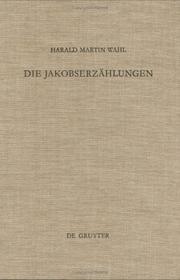
ISBN: 3110157586 9783110157581 Year: 1997 Volume: 258 Publisher: Berlin: de Gruyter,
Abstract | Keywords | Export | Availability | Bookmark
 Loading...
Loading...Choose an application
- Reference Manager
- EndNote
- RefWorks (Direct export to RefWorks)
Tradition (Judaism) --- 222.2 --- Halacha --- Halakha --- Oral law (Judaism) --- Oral tradition (Judaism) --- Zugot --- Genesis --- Jacob (Biblical patriarch) --- Bible. O.T. Genesis XXV, 19-XXXV, 29 --- Criticism [Redaction ] --- Jacob --- Īakov --- Israel --- Isrāʼīl (Biblical patriarch) --- Jacob, --- Jakob --- Yaʻaḳov --- Yaʻăqōb --- Yaʻqūb (Biblical patriarch) --- Yiśraʼel --- יעקב --- Bible. --- Criticism, interpretation, etc.
Book
ISBN: 1644692570 1618119524 1618119516 1644690608 Year: 2019 Publisher: Academic Studies Press
Abstract | Keywords | Export | Availability | Bookmark
 Loading...
Loading...Choose an application
- Reference Manager
- EndNote
- RefWorks (Direct export to RefWorks)
"The essays in this volume address the conundrum of how Jewish believers in the divine character of the Sinaitic revelation confront the essential questions raised by academic biblical studies. The first part is an anthology of rabbinic sources, from the medieval period to the present, treating questions that reflect a critical awareness of the Bible. The second part is a series of twenty-one essays by contemporary rabbis and scholars on how they combine their religious beliefs with their critical approach to the Bible."
Tradition (Judaism) --- Faith (Judaism) --- Bible. --- Criticism, interpretation, etc. --- Criticism, Redaction. --- Judaism --- Halacha --- Halakha --- Oral law (Judaism) --- Oral tradition (Judaism) --- Zugot --- Doctrines --- Antico Testamento --- Hebrew Bible --- Hebrew Scriptures --- Kitve-ḳodesh --- Miḳra --- Old Testament --- Palaia Diathēkē --- Pentateuch, Prophets, and Hagiographa --- Sean-Tiomna --- Stary Testament --- Tanakh --- Tawrāt --- Torah, Neviʼim, Ketuvim --- Torah, Neviʼim u-Khetuvim --- Velho Testamento --- Theology & Religion --- biblical criticism --- Bible --- Jewish Studies
Book
ISBN: 9781618110992 1618110993 9781936235049 1936235048 Year: 2010 Publisher: Boston Academic Studies Press
Abstract | Keywords | Export | Availability | Bookmark
 Loading...
Loading...Choose an application
- Reference Manager
- EndNote
- RefWorks (Direct export to RefWorks)
The Horizontal Society is an exposition of rabbinic thought as exemplified by Maimonides. The thought streams of Greece, Rome, and Christendom serve as a contrast. This work is in the Hebrew rhetorical tradition of melisa. The main text in five sections--The God of Israel, The Books of Israel, The Governance of Israel, The Memory of Israel, and The Folly of Israel-focuses on these core matters. It includes numerous references to orient the reader. The mode is similar to the author's previous work, such as Golden Doves with Silver Dots: Semiotics and Textuality in Rabbinic Tradition, interacting with the latest thought from today's academy. This book illustrates the horizontal organization of the Jewish people. Other social organization is based on hierarchy. Two principles made this difference possible for Israel. First, the Hebrew Scriptures alone propose that every human being is created in the image of God.This necessitates the absolute equality of every human being. Second, the Sinai covenant establishes the Law as the supreme authority. Whereas in other societies, might is the source of authority, in Judaism authority is limited by the Law. These principles were summarized by the last Prophet of Israel: "Has not one God created us? Why do we deal treacherously..., profaning the covenant of our fathers?" (Mal 2:10). There is a subdivided bibliography of forty pages, including both Jewish and "Western" sources. The scholarly apparatus includes indices of terms, names, and subjects. There are also seventy appendices of interest to rabbinic readership.
Rabbinical literature --- Tradition (Judaism) --- Jewish philosophy. --- Jews --- Philosophy, Jewish --- Philosophy, Israeli --- Halacha --- Halakha --- Oral law (Judaism) --- Oral tradition (Judaism) --- Zugot --- History and criticism. --- Philosophy --- Bible. --- Antico Testamento --- Hebrew Bible --- Hebrew Scriptures --- Kitve-ḳodesh --- Miḳra --- Old Testament --- Palaia Diathēkē --- Pentateuch, Prophets, and Hagiographa --- Sean-Tiomna --- Stary Testament --- Tanakh --- Tawrāt --- Torah, Neviʼim, Ketuvim --- Torah, Neviʼim u-Khetuvim --- Velho Testamento --- Criticism, interpretation, etc.
Book
ISBN: 1555406386 Year: 1991 Volume: vol 31 Publisher: Atlanta Scholars Press
Abstract | Keywords | Export | Availability | Bookmark
 Loading...
Loading...Choose an application
- Reference Manager
- EndNote
- RefWorks (Direct export to RefWorks)
Traditie (Jodendom) --- Tradition (Judaism) --- Tradition (Judaïsme) --- 296*2 --- Misjna. Talmud. Halachische codices . Responsen --- 296*2 Misjna. Talmud. Halachische codices . Responsen --- Rabbinical literature --- Halacha --- Halakha --- Oral law (Judaism) --- Oral tradition (Judaism) --- Zugot --- History and criticism --- Mishnah --- Mishna --- Mishnayot --- Mischnajot --- Mischna --- Mishne --- Michnah --- Mišnâh --- Mišna --- Mishnayoth --- Mishno --- Evidences, authority, etc. --- Mishnah - Evidences, authority, etc. --- Rabbinical literature - History and criticism. --- Tradition (Judaism. --- Shishah sidre Mishnah --- משנה --- ששה סדרי משנה --- משניות
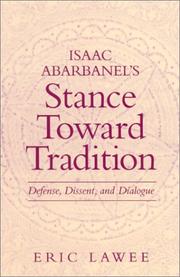
ISBN: 0791489884 0585426465 9780585426464 0791451259 9780791451250 0791451267 9780791451267 9780791489888 Year: 2001 Publisher: Albany State University of New York Press
Abstract | Keywords | Export | Availability | Bookmark
 Loading...
Loading...Choose an application
- Reference Manager
- EndNote
- RefWorks (Direct export to RefWorks)
Winner of the 2002 Nauchman Sokol-Mollie Halberstadt Prize in Biblical/Rabbinic Scholarship presented by the Canadian Jewish Book AwardsFinalist, 2002 Scholarship Morris J. and Betty Kaplun Award presented by the National Jewish Book CouncilFinancier and courtier to the kings of Portugal, Spain, and Italy and Spanish Jewry's foremost representative at court at the time of its 1492 expulsion, Isaac Abarbanel was also Judaism's leading scholar at the turn of the sixteenth century. His work has had a profound influence on both his contemporaries and later thinkers, Jewish and Christian. Isaac Abarbanel's Stance Toward Tradition is the first full-length study of Abarbanel in half a century. The book considers a wide range of Abarbanel's writings, focusing for the first time on the dominant exegetical side of his intellectual achievements as reflected in biblical commentaries and messianic writings. Author Eric Lawee approaches Abarbanel's work from the perspective of his negotiations with texts and teachings bequeathed to him from the Jewish past. The work provides insight into the important spiritual and intellectual developments in late medieval and early modern Judaism while offering a portrait of a complex scholar whose stance before tradition combined conservatism with creativity and reverence with daring.
Tradition (Judaism) --- Rabbinical literature --- Judaism --- Halacha --- Halakha --- Oral law (Judaism) --- Oral tradition (Judaism) --- Zugot --- Jewish theology --- Theology, Jewish --- History and criticism. --- Doctrines. --- Abravanel, Isaac, --- Teachings. --- Bible. --- Antico Testamento --- Hebrew Bible --- Hebrew Scriptures --- Kitve-ḳodesh --- Miḳra --- Old Testament --- Palaia Diathēkē --- Pentateuch, Prophets, and Hagiographa --- Sean-Tiomna --- Stary Testament --- Tanakh --- Tawrāt --- Torah, Neviʼim, Ketuvim --- Torah, Neviʼim u-Khetuvim --- Velho Testamento --- Criticism, interpretation, etc., Jewish.
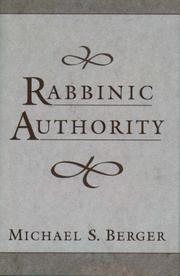
ISBN: 1280470860 0195352718 0585336113 9780585336114 9781280470868 0195122690 9780195122695 0197740634 Year: 1998 Publisher: New York Oxford University Press
Abstract | Keywords | Export | Availability | Bookmark
 Loading...
Loading...Choose an application
- Reference Manager
- EndNote
- RefWorks (Direct export to RefWorks)
This book examines the nature of the extraordinary authority accorded in Judaism to the Sages of the first five centuries C.E. These teachers occupy an unrivalled position in traditional Judaism.
Tannaim. --- Amoraim. --- Rabbis --- Rabbinical literature --- Tradition (Judaism) --- Halacha --- Halakha --- Oral law (Judaism) --- Oral tradition (Judaism) --- Zugot --- Office, Rabbinical --- Rabbinical office --- Tannaim --- Judaism --- Tanaim --- Tanaites --- Midrash --- Amoraim --- Office. --- History and criticism. --- History --- Talmud --- Bible. --- Antico Testamento --- Hebrew Bible --- Hebrew Scriptures --- Kitve-ḳodesh --- Miḳra --- Old Testament --- Palaia Diathēkē --- Pentateuch, Prophets, and Hagiographa --- Sean-Tiomna --- Stary Testament --- Tanakh --- Tawrāt --- Torah, Neviʼim, Ketuvim --- Torah, Neviʼim u-Khetuvim --- Velho Testamento --- Talmud Bavli --- Babylonian Talmud --- Talmud, Babylonian --- Talmud Vavilonskiĭ --- Talmoed, Babylonische --- Babylonische Talmoed --- Shas --- Shishah sedarim --- Talmud of Babylonia --- Talmud de Babilonia --- Talmud Babli --- Talmouth --- Talmod --- Evidences, authority, etc. --- Inspiration. --- Criticism, interpretation, etc., Jewish --- History.
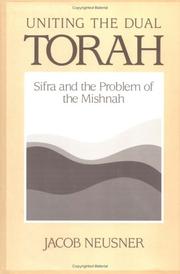
ISBN: 0521381258 0511557388 Year: 1990 Publisher: Cambridge : Cambridge University Press,
Abstract | Keywords | Export | Availability | Bookmark
 Loading...
Loading...Choose an application
- Reference Manager
- EndNote
- RefWorks (Direct export to RefWorks)
In this book Jacob Neusner analyzes the text of Sifra, a commentary on the book of Leviticus, arguing that Sifra should be understood as successfully relating the Mishnah, the authoritative writing down of the Oral Torah, to Jewish Scripture, or the written Torah. Neusner shows how Sifra's authors adopted a mediating position between the written Torah and the Mishnah, reconstructing large tracts of the Mishnah according to the logic and program of the written Torah of Leviticus.
Tradition (Judaism) --- 296*1 --- Halacha --- Halakha --- Oral law (Judaism) --- Oral tradition (Judaism) --- Zugot --- 296*1 Hebreeuwse bijbel: targum; midrasj; bijbelcommentaren; haggadische verzamelingen--(algemeen) --- Hebreeuwse bijbel: targum; midrasj; bijbelcommentaren; haggadische verzamelingen--(algemeen) --- Mishnah --- Sifra --- Sifra de-vei Rav --- Sifra de-ve Rav --- Torat Kohanim --- Midrash Sifra --- Sifra on Leviticus --- Torat ha-Kohanim --- Sefer Torat Kohanim --- Sifra Torat Kohanim --- Mishna --- Mishnayot --- Mischnajot --- Mischna --- Mishne --- Michnah --- Mišnâh --- Mišna --- Mishnayoth --- Mishno --- Shishah sidre Mishnah --- משנה --- ששה סדרי משנה --- משניות --- Relation to Sifra. --- Relation to Mishnah. --- Arts and Humanities --- Religion
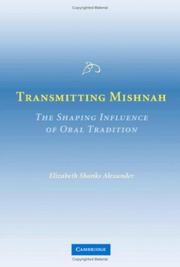
ISBN: 0511280068 0511584563 0521857503 0521104629 Year: 2006 Publisher: Cambridge : Cambridge University Press,
Abstract | Keywords | Export | Availability | Bookmark
 Loading...
Loading...Choose an application
- Reference Manager
- EndNote
- RefWorks (Direct export to RefWorks)
Departing from the conventional view of mishnaic transmission as mindless rote memorisation, Transmitting Mishnah, first published in 2006, reveals how multifaceted the process of passing on oral tradition was in antiquity. Taking advantage of the burgeoning field of orality studies, Elizabeth Shanks Alexander has developed a model of transmission that is both active and constructive. Proceeding by means of intensive readings of passages from tractate Shevuot and its Talmudic commentaries, Alexander alerts us to the fact that transmitters and handlers of mishnaic text crafted both the vagaries of expression and its received meanings. She illustrates how the authority of the Mishnah grew as the result of the sustained attention of a devoted community of readers and students. She also identifies the study practices and habits of analysis that were cultivated by oral performance and shows how they were passed on in tandem with the verbal contents of the Mishnah, thereby influencing how the text was received and understood.
Tradition (Judaism) --- Oral communication --- Jewish law --- Biblical law --- Civil law (Jewish law) --- Halacha --- Halakha --- Halakhah --- Hebrew law --- Jews --- Law, Hebrew --- Law, Jewish --- Law, Mosaic --- Law in the Bible --- Mosaic law --- Torah law --- Law, Semitic --- Commandments (Judaism) --- Oral law (Judaism) --- Oral tradition (Judaism) --- Zugot --- Religious aspects --- Judaism. --- Interpretation and construction --- History --- Law --- Mishnah --- Mishnah. --- Shevuʻot (Mishnah) --- Shevuoth (Mishnah) --- Mishna --- Mishnayot --- Mischnajot --- Mischna --- Mishne --- Michnah --- Mišnâh --- Mišna --- Mishnayoth --- Mishno --- Shishah sidre Mishnah --- משנה --- ששה סדרי משנה --- משניות --- Criticism, interpretation, etc. --- Arts and Humanities --- Religion
| Listing 1 - 10 of 14 | << page >> |
Sort by
|

 Search
Search Feedback
Feedback About UniCat
About UniCat  Help
Help News
News